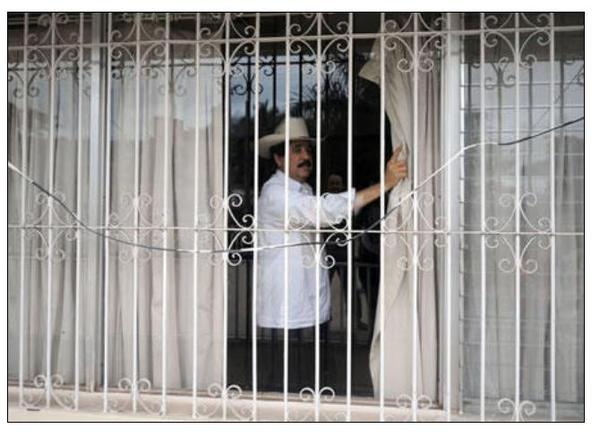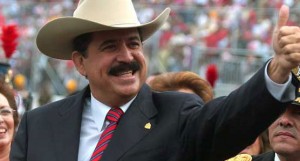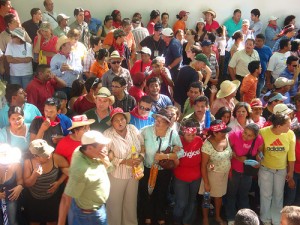There has been much discussion about the constitutional right to oust Honduras president Manuel Zelaya [1]. The crisis itself has made the headlines in many countries and many Latin American bloggers, including Brazilians, are contributing to the debate on the events.
Brazil has now been involved in an unusual diplomatic situation. Even though there is as yet no evidence that Brazil was behind the crisis in Honduras, it is safe to say that there are no similar events in the history of international law. The crisis has reached the Brazilian embassy in Tegucigalpa and prompted Brazilian bloggers to discuss international politics in Latin America and Brazil's role in these events.
Cesar Fonseca, who blogs at Independência Sul Americana [3] [South American Independence, pt], describes the events in Honduras as a disgrace among the Latin nations because they involve the exercise of power through violence, bolstered by the military forces and the hollowness of the legislation [4] in place:
Roberto Micheletti, presidente do Legislativo de Honduras, o Carlos Lacerda golpista hondurenho, errou o time histórico, ao aliar-se aos militares, para detonar governo constitucional de José Manuel Zelaya, que propôs referendo constitucional para respaldar nova Constituinte, que, entre outras determinações, suprimiria limite para mandatos presidenciais, como ocorre nas democracias européias.
For Bruno Kazuhiro, from the Perspectiva Política [6] blog [Political Perspective, pt], if Zelaya was wrong to contravene the terms of the country's constitution, so were [7] the Congress, the military forces and the judicial system that ousted him from the country without a proper trial:
O que o exército hondurenho fez foi muito errado no modo, mas não, na essência. Não deveria ter sido o exército a retirar Zelaya do poder, porém, aceita a renúncia deste pelo Congresso e nomeado o novo Presidente, Manuel Zelaya deveria sim, no fim das contas, deixar o governo. Melhor que tivesse sido voluntariamente.
Para os que me disserem que o povo hondurenho desejava mais um mandato do grupo de Zelaya, pergunto:
Por que então Zelaya não indicou sucessor e respeitou a lei?
What the Honduran army did was pretty wrong in the way they did it, but it was not wrong in itself. It was not the place of the army to strip Zelaya of his power; nevertheless, if the Congress had accepted his resignation and named a new president, Manuel Zelaya should have left the government immediately. It would have been better if he had done so voluntarily.
I ask those who say that the Honduran people wanted a new mandate of the Zelaya party:
Then why didn't Zelaya suggest a successor and respect the law?
On September 22nd, Zelaya managed to smuggle himself into Honduran territory and reach the Brazilian embassy in the capital Tegucigalpa, finding shelter for himself and 63 other supporters on the premises of the country's diplomatic mission. Immediately, the Honduran government surrounded the building, blocked access to the place and imposed a curfew on the citizens. Energy supply has been cut off, as have telephone lines in the Brazilian embassy building.
The controversy arises from the fact that Zelaya does not intend to apply to the Brazilian government for asylum, according to an interview he gave to the Globo TV Network [9], and that he is staying in the embassy for protection and as a way of mustering political support. If this is his intention, it puts Brazil in a delicate position, since Brazil is harboring a persecuted politician who isn't seeking shelter, but rather wishes to summon forces to fight those who removed him from the presidency.
The Movimento Ordem Vigília Contra a Corrupção [10] blog [pt] believes that the admittance of Zelaya to the Brazilian embassy was directly supported by Venezuelan president Hugo Chávez and demonstrates inconsistencies that point to alleged lies [11] told by the main players in this crisis:
A diplomacia terceiro-mundista tupiniquim inovou, em matéria de Direito Internacional, criando a figura do perseguido que pretende ENTRAR e não SAIR. Costuma-se conceder asilo para aquele que tenta sair do país, perseguido pelo seu governo, e Zelaya, ao contrário, entrou no país com uma súcia de 60 simpatizantes, o que desfigura a individualidade do asilo. Pior: Zelaya está usando o prédio diplomático como “bunker” da guerrilha para conclamar seus desordeiros e convulsionar as forças de ordem do país.
Brazilian 3rd world diplomacy has played around with international law by creating the figure of the refugee whose intention is to GET IN rather than OUT. It is common to grant asylum to someone who is trying to leave their country, pursued by the government, but Zelaya, on the contrary, has entered his country with a band of 60 supporters, distorting the individuality of asylum. Even worse, Zelaya is using a diplomatic building as a bunker to urge on riots by guerrillas and aggravate the country's security forces.
Chávez, moreover, is a recurring figure in reports about Zelaya's return to Honduras. He himself told the BBC [12] that he knew that Zelaya would come back to Honduras and that he had helped the president to baffle the authorities. But not all bloggers accept the idea of Chávez's influence on these events. For Leandro Fortes, who blogs at Brasília, eu vi [13] [Brasília, I have seen, pt], this theory is the cue ball of the Latin American press and the weak point of mass media. He believes that recent left-wing demonstrations have been covered in a superficial and watered-down way, ignoring their regional nuances [14] [pt]:
O jornalismo está abandonando, aos poucos, por motivos inconfessáveis, a valorização das personagens como elemento de narrativa. Emblemático é o caso de Honduras, um catalisador profundo das intenções de setores da imprensa cada vez mais perfilados em bloco sobre um ensaiado viés chavista (a nova panacéia editorial do continente) aplicado ao noticiário toda vez que um movimento de esquerda se insinua sobre velhos latifúndios – físicos e imateriais. Para tal, recorre-se cada vez mais a malabarismos de linguagem para se referir ao golpe militar que derrubou o presidente constitucionalmente eleito Manuel Zelaya.
Por conta disso, o governo golpista passou a ser chamado, aqui e acolá, de “governo de fato”, uma solução patética encontrada por alguns veículos para se referir a uma administração firmada na fraude eleitoral e na usurpação pura e simples de poder. Há, ainda, quem se refira à quadrilha de Roberto Micheleti como “governo interino”, o que só pode ser piada.
Little by little, journalism is ceasing to acknowledge the true characters in the story, due to ulterior motives. The Honduras case is symptomatic of a serious intent among sections of the media, increasingly grouped around a rehearsed “Chavist” bias (South America's new editorial panacea), to apply this to news headlines every time a left-wing group starts sniffing around issues – physical or intangible – involving the old landed estates. In doing so they are using increasingly deceptive language when referring to the military coup that ousted the constitutionally elected President Manuel Zelaya.
Because of that, the coup government has been called, over here and over there, as the “de facto government”, a pathetic solution found by some media outlets for referring to an administration based on electoral fraud and the outright usurpation of power. There are even those who refer to the Roberto Micheletti gang as the “interim government” – they must be joking.
The possibility of the Brazilian government's involvement in promoting Zelaya's return to his country has been discussed, but not confirmed, and was vehemently denied by the Brazilian Minister of Foreign Affairs, Celso Amorim, in an interview for the newspaper O Estado de São Paulo [16] [pt]. According to Amorim, Brazil has only admitted Zelaya to the embassy's premises in order to comply with the international rules of political asylum. Formally, the Brazilian government advocates the peaceful return of Zelaya to the presidency of Honduras and the call for elections. Journalist and blogger Luis Nassif [17] [pt] noted the apprehension in the Minister's comments during his interview with CNN, emphasizing that the paradigm shift in the political world now requires Brazil to take a more decisive stance on events such as Honduras’ [18] [pt]:
Mesmo que seja verdade (como disse Amorim) que o Brasil foi pego e surpresa no episódio (pedido de abrigo de Zelaya) um país que deseja se firmar como global player tem que estar preparado, não só para “surpresas” dsse tipo, como para assumir, sem hesitação ou insegurança, sua condição de protagonista, particularmente nas questões de politica continental. Para o bem ou para o mal.
Bom, espero que pelo menos a insegurança demonstrada por Amorim, (inegável na minha percepção) sirva de aprendizado.
Even if it is true (as stated by Amorim) that Brazil was surprised by this episode (Zelaya's request for asylum), a country that wishes to consolidate its position as a global player has to be prepared not only for such “surprises”, but also to assume its role as a protagonist without further hesitation or uncertainty, particularly when it comes to South American politics, for better or worse.
Well, I hope that Amorim's uncertainty (which I think was obvious enough) may at least serve as a lesson.
Gabriel Purcelli, from the Desabafo Brasil [19] blog [Outburst Brazil, pt], maintains that the Brazilian government's behavior reaffirms its position as a leader in the region. The sheltering of the so-called “constitutional president” Zelaya, in the face of the excesses of the “de facto president” Micheletti is a step which indirectly allows it to fill the gap left by the decline of US influence in Latin America [20] [pt]:
A jogada brasileira, na qual já estão publicamente envolvidos o chanceler Celso Amorim e o próprio presidente Lula, e para a qual estão utilizando a caixa de ressonância da Assembléia Geral da ONU, em Nova York, deve ser vista à luz da inquietação provocada em Brasília pela remobilização da IV Frota dos Estados Unidos no Atlântico Sul e a presença desse país em bases militares colombianas. Convencidos de que esses movimentos se destinam a contrabalançar sua força como potência emergente, os brasileiros não deixarão passar a oportunidade de se projetar, reafirmando-a.
Brazil's actions, in which the Foreign Minister Celso Amorim and President Lula are already publicly involved, and for which they are using the sounding board of the UN General Assembly in New York, must be viewed in the light of the unrest in Brasília caused by the remobilization of the 4th Fleet of the USA in the South Atlantic and the presence of this country in military bases in Colombia. Convinced that these moves are intended to offset its force as a potential emerging nation, Brazilians will seize this opportunity to assert themselves, rather than letting it slip.
Raphael Garcia Tsavkko [21] [pt] follows the same line of reasoning and points out some interesting facts regarding Brazil's participation in the resolution of this conflict. He argues [22] [pt]:
O Brasil não sai prejudicado, na verdade foi forçado – a contragosto talvez – a mostrar porque é ou quer ser o líder da América Latina. Não mais o papo de que é mas ações concretas. Resolvendo ou ajudando a resolver o conflito no país o Brasil sai fortalecido como nunca, sai com mais força para pleitear a vaga permanente no Conselho de Segurança – que conta já com o apoio entusiasmado de Sarkozy – e sai fortalecido no cenário internacional.
Brazil is not going to be harmed by this; it was actually forced – probably reluctantly – to show why it is or why it wants to be the leader of Latin America. No more bluster about already being a leader – now it has to prove it with concrete actions. By solving or helping to solve the conflict in Honduras, Brazil emerges stronger than it ever has been; it strengthens its bid for a permanent seat in the United Nations Security Council – an idea already supported enthusiastically by Sarkozy – and becomes more prominent within the international community.
The restrictions imposed on the Brazilian embassy provoke discussions about the sovereignty of the nation within the limits of the building. Although many people believe that a country's diplomatic mission constitutes foreign territory, law professor and blogger Túlio Vianna points out [23] [pt] that, even though it is not technically considered as such, the attack of an embassy must be repudiated in the same way:
A teoria atualmente dominante para legitimar as imunidades da Missão Diplomática é a “teoria do interesse da função”. Ainda segundo Celso Mello, estes privilégios e imunidades podem ser classificados em: inviolabilidade, imunidade de jurisidição civil e criminal e isenção fiscal (v2., nº511). Nas suas palavras:
“A inviolabilidade significa que nestes locais o Estado acreditado não pode exercer nenhum ato de coação (ex: ser invadido pela polícia), a não ser que haja o consentimento do chefe da Missão. Do mesmo modo, não pode ser efetuada uma citação dentro da Missão.”
Se os golpistas hondurenhos invadirem a embaixada brasileira em Honduras para capturar Zelaya, não estarão invadindo o território brasileiro, mas violando uma imunidade diplomática.
Pode ser tão grave quanto, mas não é a mesma coisa.
The currently dominant theory for justifying the immunity of the diplomatic mission is the “theory of the interest of the function”. According to Celso Mello, those privileges and immunities may be classified as: inviolability, immunity from civil and criminal jurisdiction and tax exemption (v2., n°511). In his words:
“Inviolability means that in those places the accredited state cannot practice any act of coercion (e.g. invasion by police), unless it has the consent of the head of the mission. In the same way, a court summons cannot be made inside the mission.”
If the Honduran coup leaders invade the Brazilian embassy in Honduras to capture Zelaya, they will not be invading the Brazilian territory, but they will be violating diplomatic immunity.
It looks as serious as an invasion of territory, but it is not the same thing.
It has been confirmed that on September 25th there was a toxic gas attack on the Brazilian Embassy, causing stress to the people inside the building. The attack was firmly criticized by the UN Security Council [24] [pt].
The Brazilian government says it is seeking a peaceful solution to the deadlock triggered by the return of Manuel Zelaya to Honduras. Bellicose gestures are not possible, as they would result in sending military forces to a foreign country. Still, bloggers are continuing to debate Brazil's role in the unfolding of this story.
You can read more about the political crisis in Honduras by following these Global Voices special coverage posts [25]:
June 27th: Honduras: Political Crisis Over Controversial Referendum [26]
June 29th: Honduras: Zelaya Arrested and Removed as President [27]
July 2nd: Caribbean: On the Honduran Coup [28]
July 4th: Honduras: Was it a Coup? [29]
September 24th: Honduras: Citizen Videos from a Country Under Curfew [30]
September 29th: Cuba: Eye on Honduras [31]


